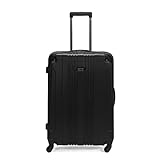
When it comes to traveling, one of the most important aspects to consider is the security of your belongings. Whether you’re going on a short weekend getaway or a long international trip, ensuring the safety of your luggage is crucial. This is where luggage locks come into play. In this comprehensive guide, we will explore the different types of luggage locks available, provide you with valuable tips on how to choose the right lock, and guide you through the process of setting them up for maximum security. So let’s dive in!
Luggage locks come in various types, each offering different levels of security and convenience. Let’s take a look at the most common types:
Key locks are the traditional type of luggage locks that require a physical key to unlock them. They provide a basic level of security but can be prone to key loss or theft. Key locks are simple to use, but it’s important to keep the key safe and easily accessible.
Our Pick –
[amazon box=”B000WO2MJG” template=”table”]
Combination locks are popular among travelers due to their convenience and security. These locks require a specific combination of numbers or letters to unlock them. Combination locks eliminate the need for keys, reducing the risk of key loss. They offer a higher level of security and are available in various designs and sizes.
Our Pick –
[amazon box=”B01M5COMNZ” template=”table”]
Cable locks are versatile locks that use a flexible cable instead of a rigid shackle. These locks are ideal for securing multiple bags together or attaching your luggage to fixed objects. Cable locks are lightweight, compact, and easy to use, making them a popular choice for travelers.
Our Pick –
[amazon box=”B08PQ1SXMV” template=”table”]
TSA-approved locks are specifically designed for air travel. These locks have a special feature that allows Transportation Security Administration (TSA) agents to open and inspect your luggage without damaging the lock. TSA-approved locks provide peace of mind while complying with airport security regulations.
Our Pick –
[amazon box=”B07DPBCV79″ template=”table”]
When it comes to choosing the right luggage lock, it’s important to consider the specific case type you’ll be using. Different locks work best for different types of luggage cases, providing optimal security and convenience. Here are some recommendations for which locks work best for each case type:
Hardshell Suitcases:
Hardshell suitcases are known for their durability and protection. For these cases, it’s recommended to choose a lock that offers maximum security. Opt for a lock with a sturdy construction, such as a key lock made from hardened steel or a combination lock with a reinforced shackle. These locks provide added resistance against tampering and can withstand the rigors of handling.
[amazon box=”B0C4VB9PLM” template=”table”]
Softside Suitcases:
Softside suitcases are lightweight and flexible, making them a popular choice for travelers. For these cases, a combination lock or a cable lock is ideal. Combination locks are easy to use and provide a high level of security. Cable locks, on the other hand, offer versatility and can be used to secure multiple bags together or attach your luggage to fixed objects.
[amazon box=”B0C4VB9PLM” template=”table”]
Backpacks:
Backpacks are commonly used for outdoor adventures and urban travel. When it comes to securing backpacks, a compact and lightweight lock is recommended. Look for a lock that can easily fit through the zippers or clasps of your backpack. Combination locks with small dials or key locks with a slim design are great options for backpacks.
[amazon box=”B076NQ87X1″ template=”table”]
Duffel Bags:
Duffel bags are versatile and often used for sports or weekend getaways. For these cases, a cable lock is a practical choice. Cable locks can be threaded through the handles or straps of duffel bags, securing them tightly. Look for a cable lock with a flexible yet strong cable that can withstand the weight and movement of the bag.
[amazon box=”B076NQ87X1″ template=”table”]
Briefcases:
Briefcases are commonly used for business travel or professional purposes. For securing briefcases, a key lock or a combination lock with a sleek design is recommended. These locks provide a professional appearance while ensuring the security of important documents and belongings.
[amazon box=”B000WO851U” template=”table”]
Remember, regardless of the case type, if you frequently travel by air, it’s advisable to choose a TSA-approved lock. These locks allow TSA agents to open and inspect your luggage without breaking the lock, ensuring hassle-free security checks. TSA-approved locks are available in various types, including key locks, combination locks, and cable locks.
If you frequently travel by air, it’s advisable to choose a TSA-approved lock. These locks allow TSA agents to open and inspect your luggage without breaking the lock, ensuring hassle-free security checks.
Now that you’ve chosen the perfect luggage lock, it’s time to set it up correctly. Follow these steps to ensure proper installation:
To maximize the effectiveness of your luggage locks, here are some valuable tips to keep in mind:
Investing in a reliable luggage lock is essential for ensuring the security of your belongings while traveling. By choosing the right type of lock, considering important factors, and properly setting it up, you can have peace of mind knowing that your luggage is protected. Remember to follow the tips provided and explore different options to find the perfect lock for your needs. Safe travels!